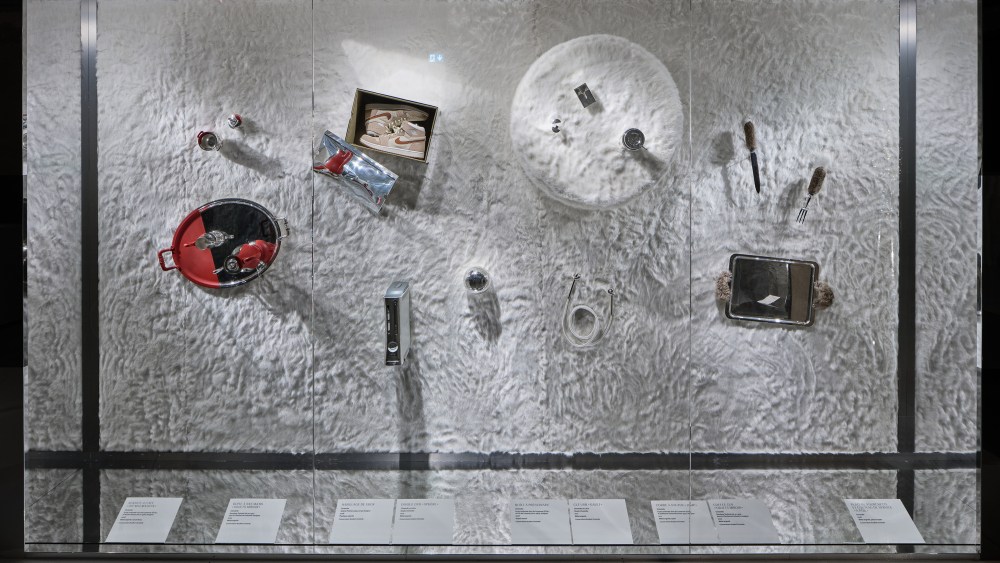Would you put a 100-place setting rife with classical sculptures made for the state dinners of French emperor Napoleon III on an equal footing with a to-go coffee cup, an USB stick and a skipping rope?
Silversmith Christofle certainly does, as explored at the Musée des Arts Décoratifs.
Three years in the making, the exhibition opening Thursday and running until April 20 is the first comprehensive dive into the history of the French house.
“Christofle has really revolutionized silversmithing by offering typologies [of objects] that were new and has always been in this idea of technical innovation,” Audrey Gay-Mazuel, the curator in charge of the museum’s 19th century — Art Nouveau collections, told WWD during a walk-through.
You May Also Like

Over 15,000 square feet, there are 1,000 items are on display, with more than half on loan from Christofle’s expansive archive of more than 70,000 pieces that range from silver utensils and sketches to advertising and tens of thousands of photographic plates, negatives and ektachromes.
Rather than offer examples of how the silversmith became a part of French tables, for royalty, bourgeoisie and diplomatic receptions alike, president and chief executive officer Emilie Viargues Metge intended the exhibition as a demonstration of its ubiquity in both in its homeland and abroad.
While overall chronological, visitors explore the craftsmanship with a recreated silversmithing workshop and a display showing the dozen steps needed to form a fork; discover how Christofle produced reproductions of historical artifacts for study, and competed in shows and international competitions, including the 1925 International Exhibition of Modern Decorative and Industrial Arts.
The exhibition starts with Charles Christofle, the jeweler turned silversmith and entrepreneur who launched the company in 1830.
After buying the silvering patent in 1842, he built a business on gold- and silversmithing by making silver-plated tableware a mainstay in the daily lives of a growing affluent bourgeoisie, instead of the preserve of nobility. At the time of his death in 1863, the company had more than 150 craftsmen and had outgrown its original Paris premises.
“What I’d like people to remember is that Christofle belongs to French patrimony,” she said, deeming it “a rare luxury house that’s touched every socio-professional category.”

A second key figure in the company’s history is Henri Bouilhet, the nephew of Charles Christofle. A chemical engineer, he invented electroplating and was a founding member of the Union Central des Arts Décoratifs, the ancestor of the museum, which he led for almost 40 years. His descendants include jewelry designer Sophie Bouilhet-Dumas.
The Japonisme, Art Nouveau and Art Deco movements are largely explored in successive displays. Among standout items are one of the designs of Émile Reiber, who headed its design atelier the mid- to late 19th century; candelabra featuring nearly life-sized Japanese figures similar to those purchased by William Henry Vanderbilt for his Fifth Avenue mansion in New York, and a side table part of the 1925 exhibition pavilion the silversmith set up with crystal-maker Baccarat.

Upstairs, a section modeled after a Christofle store offers an overview of myriad flatware styles over the decades — some still available today — as well as a cross section of the utensils offered by the company throughout the decades. Whether it’s snails, bone marrow or roasted chestnuts, there is a tool or plate for it.
Underpinning the exhibition is the idea that “everyone knows about it but no one knows it,” for the executive, who put the idea on the table shortly after her arrival at the helm of the silversmith four years ago.
“What’s pretty fantastic with Christofle is that almost everyone has an emotion with this house at some point and not necessarily with the same product,” she continued.
Open shipping crates reveal the tables of the Normandy ocean liner, the Orient Express and Air France’s Concorde, business and first class services as well as luxury hotels like the Ritz, embodying the “Air, Terre, Mer” (or air, land, sea) seen in an advertising at the time.
The “Modern and Contemporary” section alights on the brand’s role in highlighting Scandinavian design but also its artist-painted plates, initiated during World War II when silversmithing wasn’t possible due to metal rationing.
It segues into the many riffs done in collaboration with the likes of Karl Lagerfeld, Pharrell Williams and Christian Lacroix as well as scores of art and design heavyweights such as Gio Ponti and César.
There’s also Christofle’s jewelry, which returned in the mid-1980s after more than a century of absence from its offer, in the hands of Andrée Putman and jewelry designer Aurélie Bidermann.
Gay-Mazuel deemed Christofle’s hallmark “at once the savoir-faire, the innovation, the technical excellence but also diversity,” she said. “Christofle takes us everywhere, from ocean liners, universal exhibitions. [It is] in all domains at once.”

The exhibition exalts the French way of hosting — on the grandest of scales — with a table representing the setting used for the 2023 state dinner at the Elysée presidential palace hosting the U.K.’s King Charles III and a never-shown-before centerpiece with Paris-based silversmith Jean-Pierre Cottet-Dubreuil.



